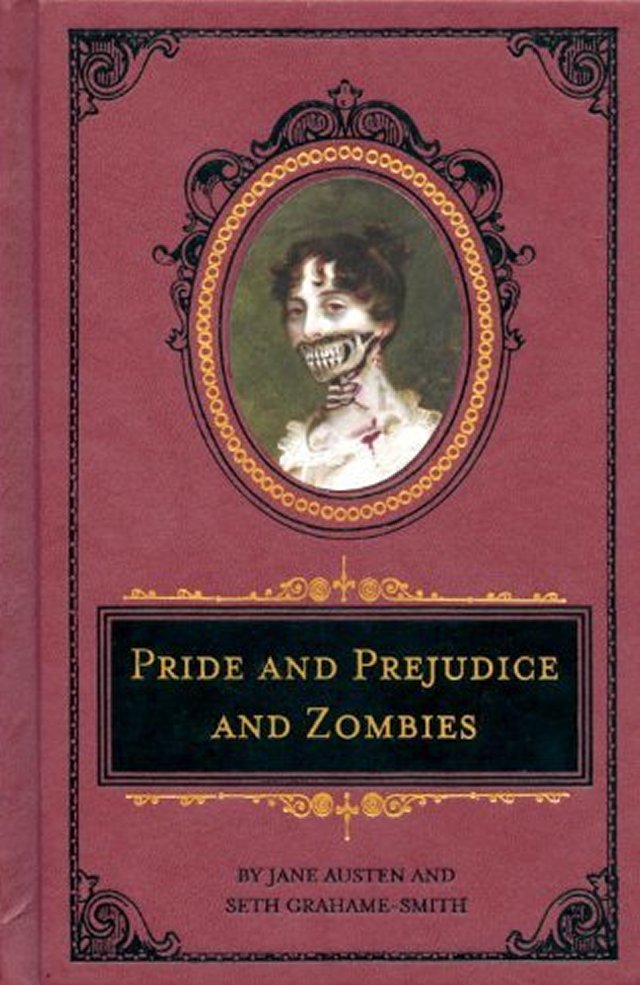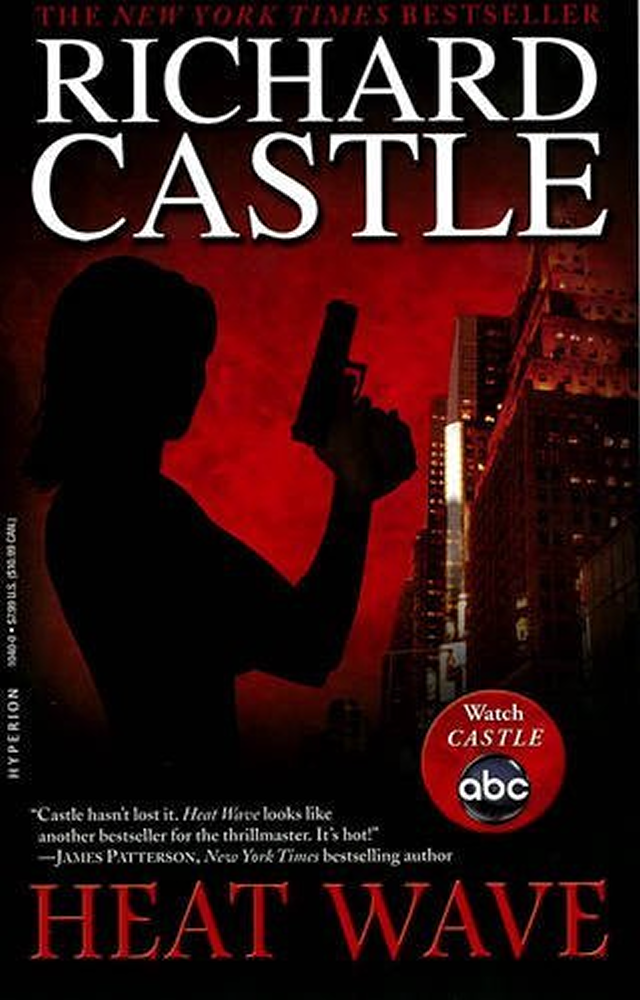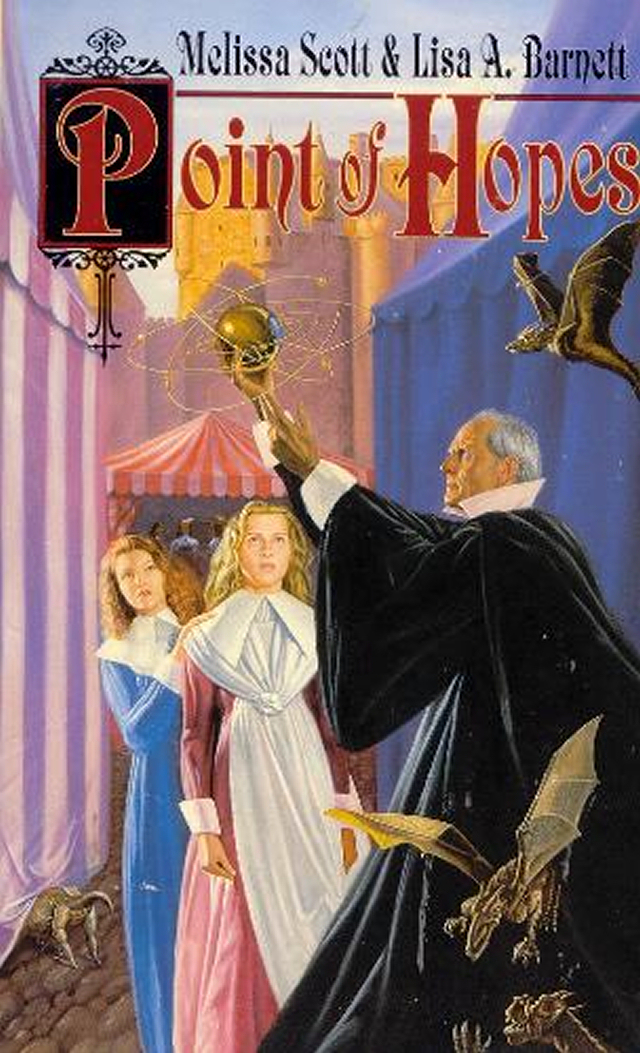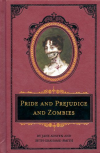 I’m the one who suggested we read Pride and Prejudice and Zombies, by Jane Austen and Seth Grahame-Smith, for October, in the spirit of Halloween. So of course it figures that I’m the last one to finish it, and not until December. It was a hard slog. Not quite as hard as Point of Hopes, but less things compelling me to keep reading. I definitely would’ve abandoned it after a few pages if I wasn’t obligated to keep going.
I’m the one who suggested we read Pride and Prejudice and Zombies, by Jane Austen and Seth Grahame-Smith, for October, in the spirit of Halloween. So of course it figures that I’m the last one to finish it, and not until December. It was a hard slog. Not quite as hard as Point of Hopes, but less things compelling me to keep reading. I definitely would’ve abandoned it after a few pages if I wasn’t obligated to keep going.
Continue reading “J’s Take on Pride and Prejudice and Zombies and bleh”
Category: j
J’s Take on Heat Wave by Richard Castle
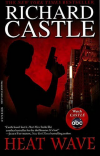
Well, what to make of this book. Heat Wave is written by fictional character, Richard Castle, from the television show, Castle. That’s not even quite the weird part. The book is also pretty much an episode of the television show, just with all the characters slightly changed. Any real author basing a novel so much on real life is likely going to be in a load of trouble with his family and friends.
Let’s.. take this in chunks:
The Writing
I had trouble getting into this book at first. As in, I had trouble at a very basic level in comprehension. It was making my brain hurt. Somewhere along the line, it got easier. I’m inclined to say that the writing got better, but it could simply be that I got used to it. I’m not quite sure, but I do have some examples, and the examples are from early on.
Metaphors and other bits of language that make you stop. And yea, they make you think, and yea, they can be a bit humorous. But they also make you stop. It interrupts the flow.
Page 1: “the tourists were […] seeking refuge in Starbucks over iced drinks ending in vowels.”
Page 3: “Rook had curled his hands to form skin binoculars”
Page 32: “what looked to her like an escalator to the basement painted red” — to describe a graph
Character name switches. She’s Nikki Heat. She’s Heat. She’s Detective Heat. She’s ‘the detective’. Just when you think the author(s) has finalized on Heat and is going to stick with it, out comes another Nikki Heat or just Nikki. And of course it happens with other characters as well. Sometimes trying to give us information by doing it, like ‘her friend’. As if we couldn’t gather that by context.
Number problems. It happened more than once. Here’s one from page 15: “Two thousand six scrape with a bouncer in SoHo; 2008, you pushed a guy […]” Did some style rulebook tell you not to start a sentence with a number? Because it’s just plain silly to say 2006 and 2008 in two different ways. Plus just silly to give a year that way in the first place.
Maybe an editor should’ve caught that? problems — page 33
“I see,” he said. And then he took the plunge. “Matthew Starr indulged some personal habits that compromised his personal fortune. He did damage.” Noah paused then took the plunge.
At one point, I had trouble following who was speaking, but looking back through, I can’t find where that was.
There were also times where something was mentioned and I had to try to remember what it was referring to. Specifically the ‘perfume ad’. If you weren’t paying attention the first time Heat’s internal monologue came up with that, you were lost. And since I was already overwhelmed with metaphors and odd little references, I did miss that the first time.
The whole feel of it, especially the dialogue, was quite like the show. If you’re not paying attention, you’re going to miss a quip. Even if you are paying attention, you’ll probably miss some quips. Or my geek repetoire is not geeky enough in the right directions (music, old movies, etc) to get everything.
The Characters
So instead of Castle, the bestselling novelist, we have Rook, the Pulitzer prize-winning journalist. Who is somehow also fabulously rich. And instead of whatever her name is, the detective on the show, we have Nikki Heat. Who you can reasonably read into as Castle’s impression of who the detective on the show is, whatever her name is. And other characters map as well, including 2 detectives or cops or whatever who do the girl detective’s bidding, but competently. Unlike some shows.
And, inexplicably, Castle/Rook’s mother, the diva. She shows up briefly in one scene, and her appearance was utterly pointless.
The characters are so like the television show, that I was brought up short every time we were reminded that Rook is a journalist. I guess he didn’t fit my image of a journalist. Wise-cracking, risk-taking, devil may care journalist? And, again, rich?
A book written by Castle?
Well, I can sort of see it. At first, I was reading it in my head in Nathan Fillion’s Castle voice, though eventually that dropped off. And yea, you can totally see a guy like him writing a hot detective chick parading around her apartment naked and then kicking butt in that state.
But then I think.. well, a real novelist.. well, a) wouldn’t map his life so closely like that, and b) should know his main character better. That is, I never really felt like I was inhabiting Nikki Heat. So I never felt like the author was either. But I guess that isn’t necessarily indicative of ‘not a real author’, but more of ‘not a very good author’.
Whoa, trippy man
The quote from the back of the book: “Rick Castle must have been doing his research because Nikki Heat has the unmistakable ring of truth.” — It actually got me thinking.. how many things on the show do we see Castle learning about that made it into the book? And I don’t know the answer to that, because I wasn’t paying close enough attention to the first season of Castle. Are there clever little things like that?
Summary
Interesting to read for what it is, though if it wasn’t what it is, I wouldn’t have read it. And if I had read it, I would’ve put it down. Because I would’ve found it rather dull. Reading all these mysteries is just confirming to me that I’m not particularly fond of them. (Ignoring that I did go through a stage in my youth of reading most of Sherlock Holmes.)
The acknowledgements deserve acknowledgement for being interesting and a bit amusing.
I’m giving the book a rather solid 3 (out of 5). An overall impression of ‘meh’, yet the compulsion to want to buy a copy and mark it up in red ink to figure out why I had such problems with its language.
J’s Take on Point of Hopes by Melissa Scott and Lisa A. Barnett
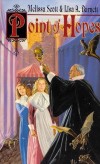 Point of Hopes is one of those titles that you can never quite remember. This is a book, really two books (the other being Point of Dreams to add to the confusion), that I’ve seen in various locations and lists. With the impetus of Triple Take, I’ve now read this one. If I can manage to remember the title of it.
Point of Hopes is one of those titles that you can never quite remember. This is a book, really two books (the other being Point of Dreams to add to the confusion), that I’ve seen in various locations and lists. With the impetus of Triple Take, I’ve now read this one. If I can manage to remember the title of it.
The cover intrigued me. It looked rather Puritan, but it also looked academic, and there were girls, or at least young women. But while I can now say the cover accurately represents an important scene in the book.. none of those first impressions were correct. No, those girls and even that guy in the robe.. none of them are main characters.
We start with an unpromising prologue. I had trouble following whose point of view it was, or in being very interested in it. Fortunately, I know that most prologues have little to do with the style and tone of the rest of the book. Unfortunately, that means you have to sit through them and get to the real first chapter before you can tell whether to give up on the book or not. Extra wasted time and effort.
This book does get better after the prologue. The point of view problems settle down… mostly. As we alternate sections and/or chapters with first one character, Rathe, a pointsman (this world’s version of a police detective), and a second, Eslingen, a militaryman between jobs acting as a hired guard. But I do say mostly, because there’s one section in particular where they’re in the same scene and the point of view gets all jumbled up again. It’s at this point that I wondered if the two authors were collaborating by each taking one character. And that they then had trouble reconciling it when the two had scenes together.
As for the plot, it’s mostly a mystery plot. Children are disappearing from the city and Rathe sees it as his job and calling and obligation to various people and whatnot to try to find out what’s going on. So a lot of the book is him running here, and running there, and talking to people, and collecting clues. And really, do people like reading mysteries and watching all this running around and talking to people? Because I don’t get a whole lot of pleasure out of it.
Things got hopeful when Rathe first lays eyes on Eslingen. He makes a point of noting he’s handsome and what he’s wearing. Which isn’t unusual, in itself, but my ears and eyes were perked for a budding romance. A love story? A romantic subplot at the very least? A friendship that slowly evolves into something more? Well, perhaps it’s a spoiler to say so, but I was denied, dear reader. DENIED!
And not in the usual way.. where all the slash is subtext that I’m probably reading into a normal manly friendship. No. Because the authors make a point of Rathe being surprised Eslingen was interested in women. And you just know, you just know, that Rathe is interested and that Eslingen probably wouldn’t be too against it either. Because there are hints throughout that this is a very bisexual sort of society. Not that everyone is, but that the society as a whole is. So that maybe, maybe, if the story of these two continues in the next book, Point of Dreams, they might move further along in this relationship. But by the end of this book, it’s not much of a relationship. It’s barely even a friendship.
GRR!
One cute thing about this world is there are gargoyles. And they’re basically like rats. They hang around the garbage and are a nuisance, but a somewhat cute sort of nuisance. Maybe more like wild cats combined with pigeons? Anyway, that’s a cool little addition. And you can see them on the cover of the book. Even if you first take them for firelizards.
The end of the book seems rushed. I even started noticing more and more typos. And then the big bad bad guy is defeated waaaaay too easily. And quickly. Perhaps, in that way, it was again more like a mystery than a typical fantasy. In a mystery, it doesn’t matter if you shoot the guy at the end, as long as you’ve proved it’s him and done all your revelations. (Not that he gets shot. That’s just an analogy.)
One other thing I should definitely say is that this book read like a very long slog. Perhaps not a particularly hard slog, but a slog. It took a lot longer to read than it looked like from the size of the book. There were a lot of words crammed onto an individual page and the chapters were incredibly long. I think there were only about 9 or 10 chapters in the whole book. I read it diligently and plowed ahead with it, but it still took me over a week to finish it.
I’m mostly left feeling that I like this world. Women are more or less equal. The gargoyles are a bit of fun. They don’t mind a bit of same-sex fooling around — prevents the apprentices and journeymen from getting pregnant. There’s an interesting political setup with the way the local police are new and still feeling out their role.. which isn’t quite the same as we know police.
But while I do like the world, and the characters aren’t bad, I just can’t like the story. It wasn’t the story I wanted, I guess.
So I’m torn. Do I revisit the world because it’s cool and I want to learn more about it? Because the authors might explore things I was more interested in? Because the main characters might finally hook up? Or do I not subject myself to another long slog for a similar plot and unfulfilled expectations?
I’m going to have to give this one a 3.
J’s Take on More Information Than You Require
John Hodgman’s More Information Than You Require is almost more information than I can stand. The premise of the book is.. a whole bunch of facts and trivia and stories that Hodgman made up. The layout fits the title and premise of the book, but really turns me off. Even the cover looks like an overload of information.
The format of the book is random facts and stories and information (mostly false) roughly sorted by topic into chapters. There’s images to spice things up. And sometimes there’s boxes. You almost feel like there would be sidebars and topbars and bottombars, but because every page also contains a Page-A-Day calendar notation, Hodgman really was running out of room.
The way I’d normally read something like this is to read everything on the page before turning the page. Eventually I had to give that up. I stopped reading the calendar entries and my enjoyment of the reading experience improved. But it was still problematic, because there were footnotes to be reading. So there’s just constant interruptions to the flow in my brain.
As for the content itself? Eh. I think this book would be far better used as a bathroom reader. Small doses would be easier to swallow, and more amusing. I did like the entries for July 12, 13, and 14th. July 31st was distinctly lacking in wizard references! I confess to skipping the several-pages-long list of molemen names. (Firefox thinks I spelled molemen wrong. I probably did.)
All in all, I like Hodgman better on television. In small chunks.
J’s Take on A Dooryard Full of Flowers
“A Dooryard Full of Flowers” is the short story sequel to Patience and Sarah by Isabel Miller. Except it would be more exact to call it a very-unfinished novel. I have a bunch of novels in just this state of completion! Well.. perhaps not a bunch, but some.
This story covers the part of the lives of Patience and Sarah that I was most interested in reading about. I wanted to hear about how they set up their home, built it up, made it cozy, faced adversity, got along with the neighbors, etc, etc.
Well, I got an itty bitty bit of that from this story. Lesigh.
The first part, and the large part it, is told from the point of view of a neighboring farmer. And his view of the women is very weird. He seems to think they’re strange, and not get that they’re shacking up together, of course. But he also goes on and on admiring them. Wanting them to be independent and succeed. All the while snickering behind his wife’s back that she thinks the women would be fine wives for their sons. He thinks they’re unsuitable for his sons because.. well, I think basically because they’d be hard to control and just not very pleasant to be married to.
That’s not resolved or anything, but they all pay a visit (sons included), and think the house is dressed up rather frivolously, with all of Patience’s pictures that they don’t realize are Patience’s. And then the wife comes out of it not liking them at all, for some slight or other.
Then we get Sarah’s point of view for a bit. In which we get a completely silly scene involving Patience thinking to be fair and equal, she needs to work in the fields. Which is completely ridiculous if they expect to survive on this stupid farm. She decides she’s rubbish at the hoeing and whatnot, because she’s not wearing pants. So then, IN THE MIDDLE OF THE WORKING DAY, they trot back home so Sarah can undress and a pattern of her clothes can be cut, so Patience can make similar clothes for herself.
And well, that’s about it. The story, or the novel fragment, or whatever you want to call it, stops.
Two girls try to play house and farm, and are all set to utterly fail and starve to death.
